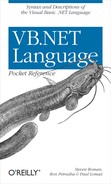Name
Declare Statement
Synopsis
Syntax for subroutines: [accessmodifier] Declare [Ansi|Unicode|Auto] Subname_Lib "libname" [Alias "aliasname"] [([arglist])] Syntax for functions: [accessmodifier] Declare [Ansi|Unicode|Auto] Functionname _Lib "libname" [Alias "aliasname"] [([arglist])] [Astype]
accessmodifieroptional; Keywordaccessmodifiercan be any one of the following:Public,Private,Protected,Friend, orProtectedFriend. The following table describes the effects of the various access modifiers. Note that direct access refers to accessing the member without any qualification, as in:classvariable = 100
and class/object access refers to accessing the member through qualification, either with the class name or the name of an object of that class.
|
Direct access scope |
Class/objectaccess scope | |
|
|
Declaring class |
Declaring class |
|
|
All derived classes |
Declaring class |
|
|
Derived in-project classes |
Declaring project |
|
|
All derived classes |
Declaring project |
|
|
All derived classes |
All projects |
Ansioptional; KeywordConverts all strings to ANSI values.
Unicodeoptional; KeywordConverts all strings to Unicode values.
Autooptional; KeywordConverts the strings according to .NET rules based on the name of the method (or the alias name, if specified). If no modifier is specified,
Autois the default.namerequired; String literalAny valid procedure name. Note that DLL entry points are case sensitive. If the
aliasnameargument is used,namerepresents the name by which the function or procedure is referenced in your code, whilealiasnamerepresents the name of the routine as found in the DLL.Librequired; KeywordIndicates that a DLL or code resource contains the procedure being declared.
libnamerequired; String literalName of the DLL or code resource that contains the declared procedure.
Aliasoptional; KeywordIndicates that the procedure being called has another name in the DLL. This is useful when the external procedure name is the same as a keyword. You can also use
Aliaswhen a DLL procedure has the same name as a public variable, constant, or any other procedure in the same scope.Aliasis also useful if any characters in the DLL procedure name aren’t allowed by VB.NET naming conventions.aliasnameoptional; String literalName of the procedure in the DLL or code resource. If the first character is not a number sign (
#),aliasnameis the name of the procedure’s entry point in the DLL. If#is the first character, all characters that follow must indicate the ordinal number of the procedure’s entry point.arglistoptionalList of variables representing arguments that are passed to the procedure when it is called.
typeoptional; KeywordData type of the value returned by a Function procedure; may be
Byte,Boolean,Char,Short,Integer,Long,Single,Double,Decimal,Date,String,Object, or any user-defined type. Arrays of any type cannot be returned, but an Object containing an array can.
